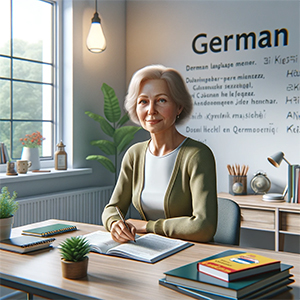German Lesson 6
Health

Allow me to introduce myself: I am Ewa, your German teacher. Today I feel perfect – in the morning I went for a long walk, which gave me energy for the rest of the day. I hope you are ready to learn!
Today we will focus on a critical topic, especially for you, carers of the elderly – health. Health is the foundation of our lives, and its importance grows with age. That’s why today’s lesson will focus on vocabulary related to health and care for the elderly.
German vocabulary
Here are 10 words we will learn today. I have prepared them in both languages to make it easier for you to understand and remember:
- Health – das Gesundheit
- Doctor – der Arzt
- Medication -das Medication
- Hospital – das Krankenhaus
- Help – die Hilfe
- Exercises – die Übungen
- Diet -die Diät
- Dream -der Schlaf
- Pain -der Schmerz
- Well-being -das Befinden
We will focus on the pronunciation, meaning, and context of the use of these words. Are you ready to learn? Let’s get started!
Dialogues in German
Dialogue 1: Visit to the Doctor
Ewa: Guten Morgen, Herr Martin. Wie fühlen Sie sich heute? (Good morning, Mr. Martin. How are you feeling today?)
Martin: Guten Morgen, Ewa. Ich fühle mich wenig müde und mein Rücken schmerzt. (Good morning, Eva. I feel a little tired and my back hurts.)
Dialogue 2: Planning the Day
Ewa: Herr Martin, was möchten Sie heute tun? Vielleicht etwas im Garten arbeiten oder Musik hören? (Mr. Martin, what would you like to do today? Maybe do some work in the garden or listen to some music?)
Martin: Ja, der Garten wäre schön. Aber ich muss vorsichtig sein wegen meines Rückens. (Yes, gardening would be fine, but I have to be careful because of my back.)
Dialogue 3: Memories and Stories
Ewa: Herr Martin, erzählen Sie mir von Ihrer Zeit als Lehrer. Ich bin sicher, dass Sie viele interessante Geschichten haben. (Mr. Martin, please tell me about your time as a teacher. I am sure you have many interesting stories.)
Martin: Oh, das waren Zeiten. Ich habe Geschichte unterrichtet und hatte immer eine Leidenschaft für das Erzählen. (Oh, those were the days. I taught history and always had a passion for storytelling.)
These dialogues cover a wide range of topics, from health issues to everyday activities, to memories and life stories, fostering natural language learning and building relationships between caregivers and seniors.
Assignments and exercises for students
Task 1: Pronunciation Exercise
Keywords: Listen, repeat, speaker, pronunciation
Task description: Listen carefully to the above dialogues and repeat after the instructor. We recommend that you do this several times, focusing on correct pronunciation and intonation.
Objective: To improve pronunciation and understanding of German in the context of conversation.
Task 2: Creative Dialog Modification
Keywords: Modification, dialogues, senior, dictionary, memorization
Task Description: Try modifying the dialogs above to fit your potential conversations with a senior. You can save them to remember better. Select 5 words from the dialogs, check their meaning in the dictionary, and save them. In your spare time, repeat these words to better remember them.
Objective: To develop the ability to create your own dialogues in German, increase the vocabulary and the ability to use the dictionary.
Remember that regular practice and repetition is the key to success in language learning. These tasks will help you to better communicate with your mentees and understand their needs. Good luck!
Interesting facts about the German language

Today’s curiosity is about an aspect of the German language that you may often encounter, especially when working with older people.
Did you know that in German there is a phenomenon called Siezen and Duzen? This means using the formal form of Sie (Mr./Mrs.) or the informal form of Du (you) during the conversation. In German culture, the choice between Sie and Du is significant and is closely related to etiquette and respect. Traditionally, Sie is used in official situations or when talking to people we know less or are older. Du is reserved for friends, family or in more relaxed, youthful contexts.
I recently had the opportunity to experience this in practice. When I visited my grandmother, who lives in Germany, I noticed how important it is for her when younger people speak to her per Sie. It shows the respect and distance that is valued in German culture.
As caregivers for the elderly living in Germany, it is indispensable for you to understand these subtleties in German. Using the right form can greatly affect your relationship with your ward. Remember that language is not just words, but also culture and etiquette!
I look forward to the next lessons, during which we will continue to explore the fascinating world of the German language and its cultural nuances. Bis bald! (See you soon!)
Lesson summary
Dear students, thank you for your active participation in today’s German for carers – health lesson. I hope that the acquired knowledge and practical language skills will be a valuable support for you in the daily care of the elderly.
Today we focused on the key aspect of care – health. We learned new vocabulary, rehearsed dialogues and explored the practical use of German in the context of elderly care. Your hard work and commitment to learning are really inspiring!
Keywords for today’s lesson: health, care, communication, empathy, understanding.
Do not forget about the homework that will help you preserve today’s materials. Regular practice is the key to success, and your progress is the best reward for me!
I cordially invite you to our next meeting, which will take place soon. We will continue our journey through the German language, discovering new words and phrases that will make it easier for you to communicate with older people. Remember that every lesson is a step closer to fluency in German and a more profound understanding of the needs of your students.
See you on the Hrily platform – a place where care and learning go hand in hand.
Back to the first German lesson.